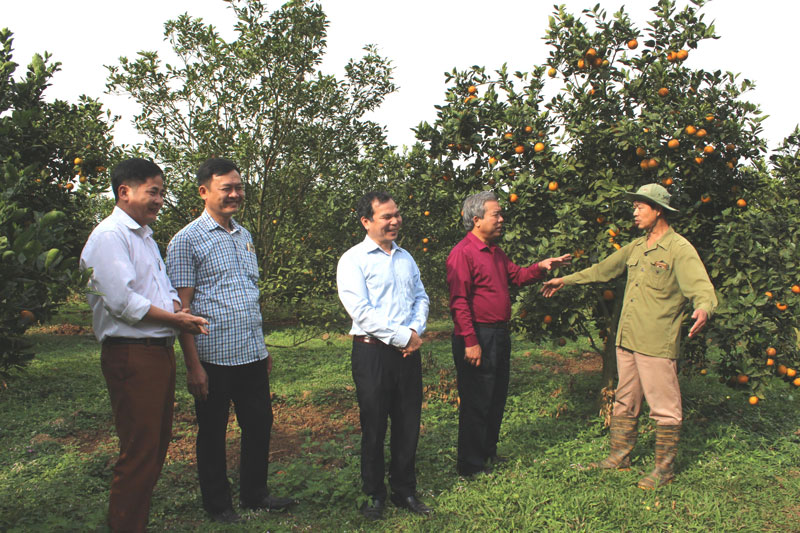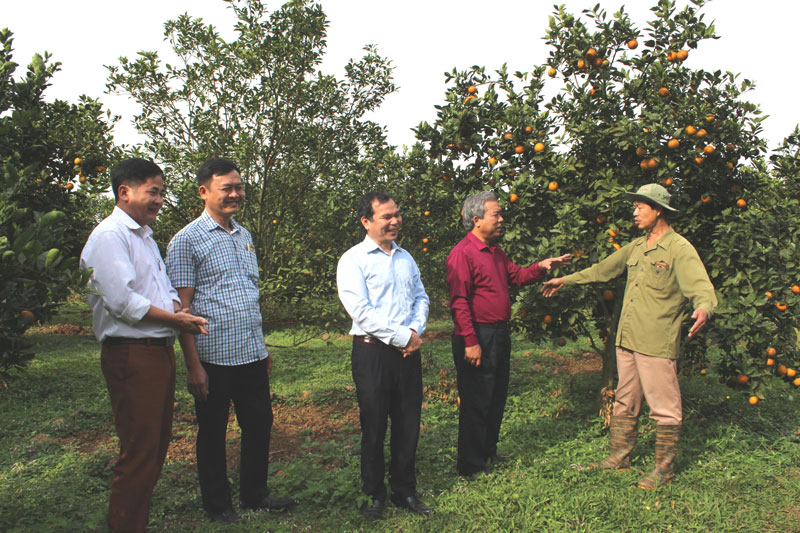
HBO – In 2018, Hoa Binh planted about 3,437 hectares of vegetable and bean of different kinds, up 18.9 percent over the previous year. With an average yield of 12-14 tonnes per hectare and output of 4,100 – 4,800 tonnes, the plants bring about an income of 80-130 million VND per hectare each crop for farmers, continuing to create more imprints in local agricultural production.
Up to now, the district has initially formed concentrated
vegetable production areas suitable to the ecological conditions of each
region, such as the one of gourd, pumpkin, cucumber, leek, bitter cucumber
and potato.
Besides, Kim Boi district has also developed citrus fruit
trees such as oranges, tangerines and grapefruit. As of early 2019, the total
area of citrus tree farm in the district was nearly 1,300 hectares, mostly in
the communes of Tu Son, Du Sang, Vinh Tien, Bac Son, Hung Tien, Kim Son, Nam
Thuong and My Hoa.
Chu Van Duong, head of Dong Ha village in My Hoa commune,
said that fruit trees are one of the priorities in the process of improving
gardens and transforming the structure of the cultivation sector in Dong Ha as
well as many other localities Kim Boi district.

The model of transforming a hodgepodge farm into orange and grapefruit
farm in Dong Ha village, My Hoa commune.
"Since 2013, my family pioneered converting nearly 1 hectare
of garden into orange and tangerine farm. Over the last two years, the farm has
regularly brought to the family an income of over 200 million VND each year,”
said Duong.
At present, Dong Ha hamlet has about 62ha of orange. Gardens
with mix plants have gradually been replaced with orange, grapefruit and some
kinds of crops with competitive advantages in the market.
Bui Van Dum, Chairman of Kim Boi district People's Committee,
said that the district People's Committee actively directed the implementation
of the scheme of upgrading trash gardens, considering it as a necessary motivation
to promote the process of transforming crop structure and restructuring the
cultivation sector of the locality.
In 2018, along with maintaining the area of developed
farms of 2017 at 100 hectares spanning 14 communes, the district converted another
82 hectares of mixed gardens, and supported farmers with over 19,200 high-value
fruit tree saplings such as longan, Dien grapefruit, Thai jackfruit, sapodilla,
mango, guava and custard apple, thus encouraging local famers to upgrade their
gardens and restructure crop structure.
According to data from the Hoa Binh Provincial Party Committee, the industrial production index for the first six months of 2025 is estimated to have increased by 20% compared to the same period last year. This marks the highest year-on-year growth rate for this period since 2020.
In the first six months of 2025, Hoa Binh province’s export turnover was estimated at 1.145 billion USD, marking an 18.11% increase compared to the same period in 2024. Import turnover was estimated at $ 804 million, a 17.15% increase, which helped the province maintain a positive trade balance.
The lives of the ethnic minority farmers in Tan Lac district have gradually improved thanks to the new directions in agricultural production. This is a testament to the collective strength fostered through the professional associations and groups implemented by various levels of the district’s Farmers’ Union.
With the motto the "product quality comes first,” after nearly one year of establishment and operation, Muong village’s Clean Food Agricultural and Commercial Cooperative, located in Cau Hamlet, Hung Son Commune (Kim Boi district), has launched reputable, high-quality agricultural products to the market that are well-received by consumers. The products such as Muong village’s pork sausage, salt-cured chicken, and salt-cured pork hocks have gradually carved out a place in the market and they are on the path to obtaining the OCOP certification.
In the past, the phrase "bumper harvest, rock-bottom prices" was a familiar refrain for Vietnamese farmers engaged in fragmented, small-scale agriculture. But today, a new spirit is emerging across rural areas of Hoa Binh province - one of collaboration, organisation, and collective economic models that provide a stable foundation for production.
Maintaining growing area codes and packing facility codes in accordance with regulations is a mandatory requirement for agricultural products to be eligible for export. Recently, the Department of Agriculture and Environment of Hoa Binh province has intensified technical supervision of designated farming areas and packing facilities to safeguard the "green passport" that enables its products to access international markets.



